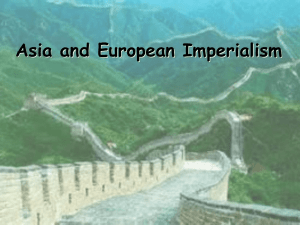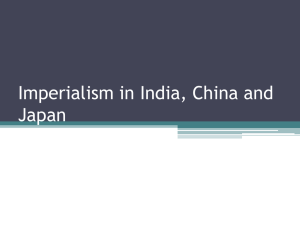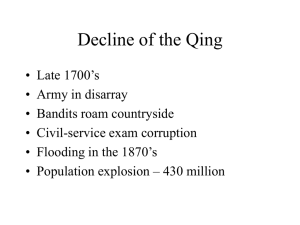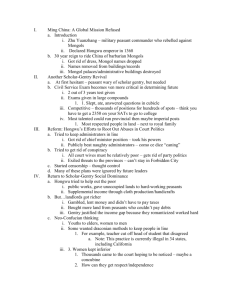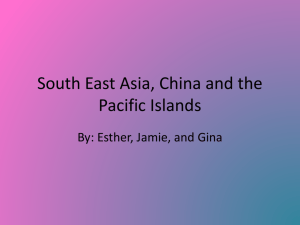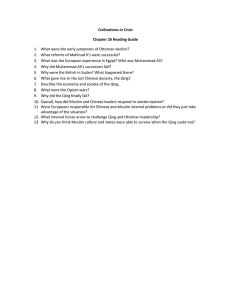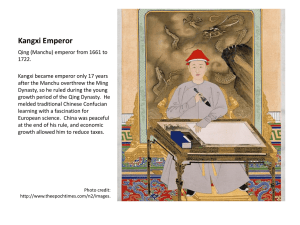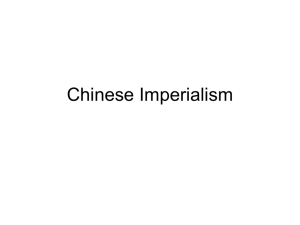Name: ____________________________ Date: ____________________ Per: ___________ AP World History II
advertisement
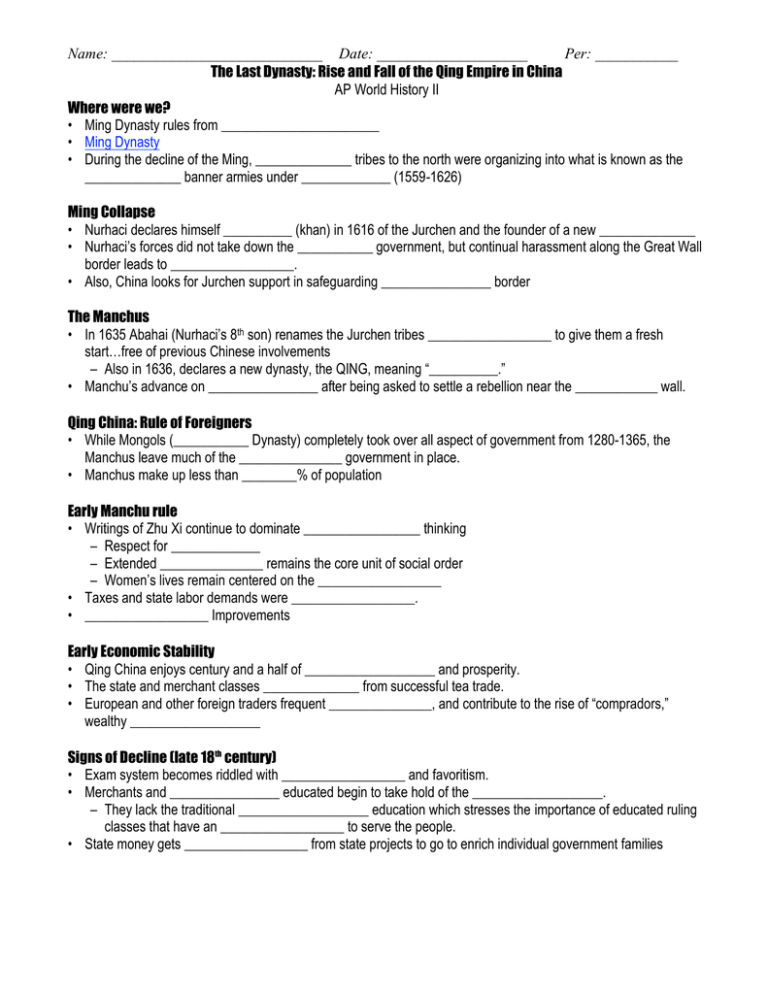
Name: ____________________________ Date: ____________________ Per: ___________ The Last Dynasty: Rise and Fall of the Qing Empire in China AP World History II Where were we? • Ming Dynasty rules from _______________________ • Ming Dynasty • During the decline of the Ming, ______________ tribes to the north were organizing into what is known as the ______________ banner armies under _____________ (1559-1626) Ming Collapse • Nurhaci declares himself __________ (khan) in 1616 of the Jurchen and the founder of a new ______________ • Nurhaci’s forces did not take down the ___________ government, but continual harassment along the Great Wall border leads to __________________. • Also, China looks for Jurchen support in safeguarding ________________ border The Manchus • In 1635 Abahai (Nurhaci’s 8th son) renames the Jurchen tribes __________________ to give them a fresh start…free of previous Chinese involvements – Also in 1636, declares a new dynasty, the QING, meaning “__________.” • Manchu’s advance on ________________ after being asked to settle a rebellion near the ____________ wall. Qing China: Rule of Foreigners • While Mongols (___________ Dynasty) completely took over all aspect of government from 1280-1365, the Manchus leave much of the _______________ government in place. • Manchus make up less than ________% of population Early Manchu rule • Writings of Zhu Xi continue to dominate _________________ thinking – Respect for _____________ – Extended _______________ remains the core unit of social order – Women’s lives remain centered on the __________________ • Taxes and state labor demands were __________________. • __________________ Improvements Early Economic Stability • Qing China enjoys century and a half of ___________________ and prosperity. • The state and merchant classes ______________ from successful tea trade. • European and other foreign traders frequent _______________, and contribute to the rise of “compradors,” wealthy ___________________ Signs of Decline (late 18th century) • Exam system becomes riddled with __________________ and favoritism. • Merchants and ________________ educated begin to take hold of the ___________________. – They lack the traditional ___________________ education which stresses the importance of educated ruling classes that have an __________________ to serve the people. • State money gets __________________ from state projects to go to enrich individual government families Qing Decline • Shandong Peninsula – Huang He River dikes failed, leaving millions of peasants without _______________, or land – Hundreds of thousands die as a result of _____________. • Food ______________-• ______________________ • Many Chinese left their futures to the _____________ cycle…as in, if the dynasty is in decline, it will be replaced. – But, this was a different world by the late _____________________! From the South… • Manchu rulers treat the Europeans like the ____________ who they see as __________________ – European civilization is equal to that of China – European civilization is ____________, but were better organized and had superior ______________ Unfavorable Trade • Chinese were unwilling to accept British __________________ goods or raw materials in exchange for trade of silks, porcelains, teas, etc. that they were trading from the Chinese Empire. – Forced the British to trade in silver ___________________ – Until, they begun to engage in the trade of _________________ (from ______________) Opium Trade • Britain ________________ the unfavorable terms of trade and begins to trade Opium with _________. • Chinese soon realize that the Opium trade was a major threat to their ____________ order. • Chinese _________________ balance of trade was reversed • By 1838 1% of 400 million were ________________ • Opium dens spread at an alarming rate • Government officials were __________________ Attempting to halt the Opium Trade • Late 1830’s-Emperor sent Lin Zexu (famous for his incorruptibility) to stop the _______________ Opium trade. • Lin ordered the European trading areas in Canton to be _________________, warehouses ___________________, and opium ______________________ and destroyed. • European merchants demand __________________ arguing that Lin’s measures violate principles of free trade • Lin persists and war breaks out in 1839 The Opium War • China is beaten at __________________, then on land. • Qing emperor must sign peace treaty in __________________ • Allows Britain to open free trade, and opens _______________ Kong as center of British commerce Taiping Rebellion • Defeat in _________________ War and gradual incursions of western powers in the South continued to decay the Qing Dynasty. • Taiping Rebellion: _________________ offered sweeping programs of social reform, land distribution, and __________________ of women – Attacked traditional ____________________ elite Taiping Rebellion and Response • Dynamic, and responsible Qing leaders who were being discredited by the Taiping Rebellion launched the ________________-____________________ movement. – Aimed at countering the challenge from the ______________. – Encouraged western investment in ____________________ and factories. – Was able to bring down the Taiping ______________________ Qing Stubbornness • Loss in war with Japan ___________-1895 (First Sino-Japanese War) • Manchu leaders stubbornly resist __________________ that would help save regime. • Empress _______________: ultraconservative who executes leaders of reform. – Defies _________________ powers Boxer Rebellion • Secret Chinese Society (Society of _____________________ and Harmony) whose main goals was the eradication of all foreigners from China, known to the west as, the ________________. • Boxers attacked foreign settlements beginning in __________________. • Foreign governments sent in military to quell revolt. – Cixi orders the death of all ________________________ – By 1901 though, the imperialist powers of the west defeated the Boxer Uprising and forced a peace treaty to be signed. Boxer Uprising • Failed Boxer _____________________ leads to an even greater control over China’s internal affairs from the Western ___________________ powers. The Fall of the Qing • The new resistance movements of the early 20th century were organized by secret societies with __________________ __________________ males as their membership. • Resistance was aimed at not just ridding China of the _______________________, but of power passing to a new, strong nation-state modeled from the _________________. The Fall of the Qing • Sun Yat-sen was an aspiring ___________________ who saw seizing power as a way to enact desperately needed social programs to relieve misery of __________________ and urban workers The New Revolutionary Spirit • Revolutionaries were from rising _________________ class – Hostile to the involvement of _________________ powers in Chinese affairs – Hostile to the ____________________ for their failure to control the foreigners. • Small movements grew such that in _________________ an uprising against foreign loans for railway projects led to mutiny on the part of imperial troops. – Provincial officials refuse to put down the _______________________. 1911-1912 • Young Emperor _______________, the last _____________, was deposed and the Manchus abdicated by ____________. • The 1911 Revolution brought about a _____________________ form of government in China
